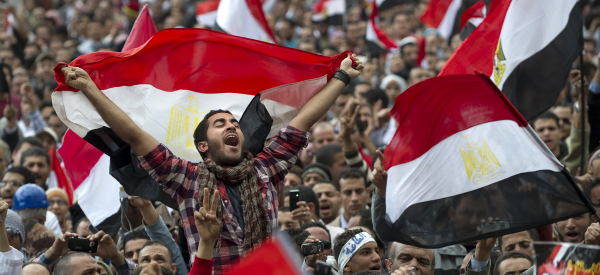 The American Revolution and the broad romantic view of U.S. democracy have often provided inspiration and guidance to those seeking democracy in their own nations – and for good reason. The amazing set of circumstances that made the American Revolution spark and then succeed, the lofty words of human rights that fueled the new government and still ring universally, and the high quality of those first American leaders are the stuff democratic dreams are made of.
The American Revolution and the broad romantic view of U.S. democracy have often provided inspiration and guidance to those seeking democracy in their own nations – and for good reason. The amazing set of circumstances that made the American Revolution spark and then succeed, the lofty words of human rights that fueled the new government and still ring universally, and the high quality of those first American leaders are the stuff democratic dreams are made of.
So as the hopefully democratic elections draw closer in Egypt, it may be helpful for democracy supporters there to look again at what happen to keep the American Revolution on track when it looked like it could wither apart before it really took root.
On May 9, 1754, a political cartoon penned by Benjamin Franklin appeared in a Philadelphia newspaper, showing a snake cut into eight pieces. Each piece was labeled with the name of one of the colonies. The cartoon appeared along with Franklin’s editorial about the “disunited state” of the colonies, and helped make his point about the importance of colonial unity.
“Join or die” the caption said. Franklin knew if the different democratic factions could not unite any hope for a full democracy would perish. That is a warning those seeking democracy in Egypt today should heed – and heed now.
Right now in Egypt competing agendas have thwarted a united front against the ruling military. Distrust, resentment, competitive juices and desire for power have broken down the facade of unity that briefly existed on the streets during the Arab Spring last year.
Join or die.
At last week’s rally all sides were accusing the generals of manipulating the forthcoming presidential elections to preserve their power. They are grasping what the cynical — and thus realistic — outside observers knew long ago: the quickness to which elections were promised in Egypt accomplished the goal of the military to convince protesters that reforms and democracy were on the way. It gave those in power time to regroup and then slowly offer changes that would give the illusion of democracy – but not real change.
It seems to have worked. Not only did the gap between last year’s revolt and next month’s election give those in power time to recalibrate, it gave those seeking power the time to realize their differences. And that was another part of the gambit eyed by those in power.
To add to the unbalancing, an election commission established by those in power disqualified 10 candidates, including the top three contenders. Political chaos in the lead-up to the vote has fueled fears that the military aims to push a candidate it favors into the presidency to ensure its continued influence and block dramatic reform.
Join or die.
Liberals and leftists accuse the Muslim Brotherhood of abandoning the “revolution” months ago and allying with the military in hopes of securing power. In a huge rally in Tahrir Square last week, many charged the Brotherhood was only returning to the streets after the generals proved more powerful in decision-making even after an Islamist-dominated parliament was elected. The liberal groups bark that the Brotherhood could accommodate the military again for a chance to govern.
These activists who were leaders in last year’s anti-Mubarak uprising urged the Brotherhood and other Islamists to agree with them on a single candidate for president who would pursue a “revolutionary” agenda of reform and confront the military. The Brotherhood had declined to step aside in favor of a consensus figure. To liberals, that insistence on running fuels the perception that it seeks to monopolize power. And many on the secular side are embittered by events of the last year, when they held anti military protests only to have the Brotherhood oppose their street action.
Some outsiders look at the bright side, suggesting that from the maelstrom could rise a victor who is better suited to earn broader approval among Egypt’s voters and work smoothly with the U.S. and other foreign governments.
“All of those (who were disqualified) would have been really controversial candidates,” said Michele Dunne, a former State Department official now at the Atlantic Council told the Wall Street Journal. “What we’re back to now is other candidates who are perhaps better candidates” adding “there’s no knight in shining armor out there.” (http://online.wsj.com/article/SB10001424052702304818404577350012221339598.html?mod=googlenews_wsj)
Join or die.
In 1754 the 13 different colonies had different interests and priorities. The individual leaders struggled and fought over if they should unite and, if so, how. It was a crucial moment. The political cartoon has been called “the first symbol of a unified America.”
It got the colonies through the initial bickering and saved that day for them. More importantly, it gave American democracy a chance for the future. That is a lesson worth learning.
PHOTO: Photograph: Maya Alleruzzo/AP